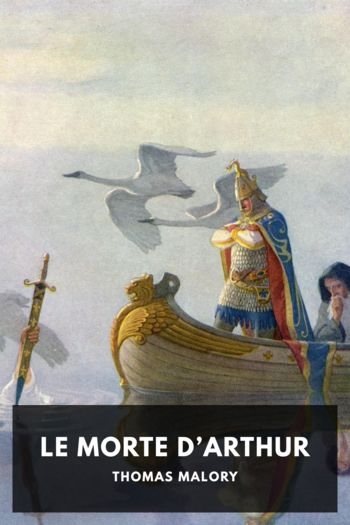Le Morte d’Arthur - Thomas Malory (best android ereader TXT) 📗

- Author: Thomas Malory
Book online «Le Morte d’Arthur - Thomas Malory (best android ereader TXT) 📗». Author Thomas Malory
When the king had well rested him at the abbey, he rode unto Camelot, and found his queen and his barons right glad of his coming. And when they heard of his strange adventures as is afore rehearsed, then all had marvel of the falsehood of Morgan le Fay; many knights wished her burnt. Then came Manassen to court and told the king of his adventure. Well, said the king, she is a kind sister; I shall so be avenged on her an I live, that all Christendom shall speak of it. So on the morn there came a damosel from Morgan to the king, and she brought with her the richest mantle that ever was seen in that court, for it was set as full of precious stones as one might stand by another, and there were the richest stones that ever the king saw. And the damosel said, Your sister sendeth you this mantle, and desireth that ye should take this gift of her; and in what thing she hath offended you, she will amend it at your own pleasure. When the king beheld this mantle it pleased him much, but he said but little.
XVIHow the Damosel of the Lake saved King Arthur from mantle that should have burnt him.
With that came the Damosel of the Lake unto the king, and said, Sir, I must speak with you in privity. Say on, said the king, what ye will. Sir, said the damosel, put not on you this mantle till ye have seen more, and in no wise let it not come on you, nor on no knight of yours, till ye command the bringer thereof to put it upon her. Well, said King Arthur, it shall be done as ye counsel me. And then he said unto the damosel that came from his sister, Damosel, this mantle that ye have brought me, I will see it upon you. Sir, she said, It will not beseem me to wear a king’s garment. By my head, said Arthur, ye shall wear it or it come on my back, or any man’s that here is. And so the king made it to be put upon her, and forth withal she fell down dead, and never more spake word after and burnt to coals. Then was the king wonderly wroth, more than he was to-forehand, and said unto King Uriens, My sister, your wife, is alway about to betray me, and well I wot either ye, or my nephew, your son, is of counsel with her to have me destroyed; but as for you, said the king to King Uriens, I deem not greatly that ye be of her counsel, for Accolon confessed to me by his own mouth, that she would have destroyed you as well as me, therefore I hold you excused; but as for your son, Sir Uwaine, I hold him suspect, therefore I charge you put him out of my court. So Sir Uwaine was discharged. And when Sir Gawaine wist that, he made him ready to go with him; and said, Whoso banisheth my cousin-germain shall banish me. So they two departed, and rode into a great forest, and so they came to an abbey of monks, and there were well lodged. But when the king wist that Sir Gawaine was departed from the court, there was made great sorrow among all the estates. Now, said Gaheris, Gawaine’s brother, we have lost two good knights for the love of one. So on the morn they heard their masses in the abbey, and so they rode forth till that they came to a great forest. Then was Sir Gawaine ware in a valley by a turret [of] twelve fair damosels, and two knights armed on great horses, and the damosels went to and fro by a tree. And then was Sir Gawaine ware how there hung a white shield on that tree, and ever as the damosels came by it they spit upon it, and some threw mire upon the shield.
XVIIHow Sir Gawaine and Sir Uwaine met with twelve fair damosels, and how they complained on Sir Marhaus.
Then Sir Gawaine and Sir Uwaine went and saluted them, and asked why they did that despite to the shield. Sir, said the damosels, we shall tell you. There is a knight in this country that owneth this white shield, and he is a passing good man of his hands, but he hateth all ladies and gentlewomen, and therefore we do all this despite to the shield. I shall say you, said Sir Gawaine, it beseemeth evil a good knight to despise all ladies and gentlewomen, and peradventure though he hate you he hath some certain cause, and peradventure he loveth in some other places ladies and gentlewomen, and to be loved again, an he be such a man of prowess as ye speak of. Now, what is his name? Sir, said they, his name is Marhaus, the king’s son of Ireland. I know him well, said Sir Uwaine, he is a passing good knight as any is alive, for I saw him once proved at a jousts where many knights were





Comments (0)